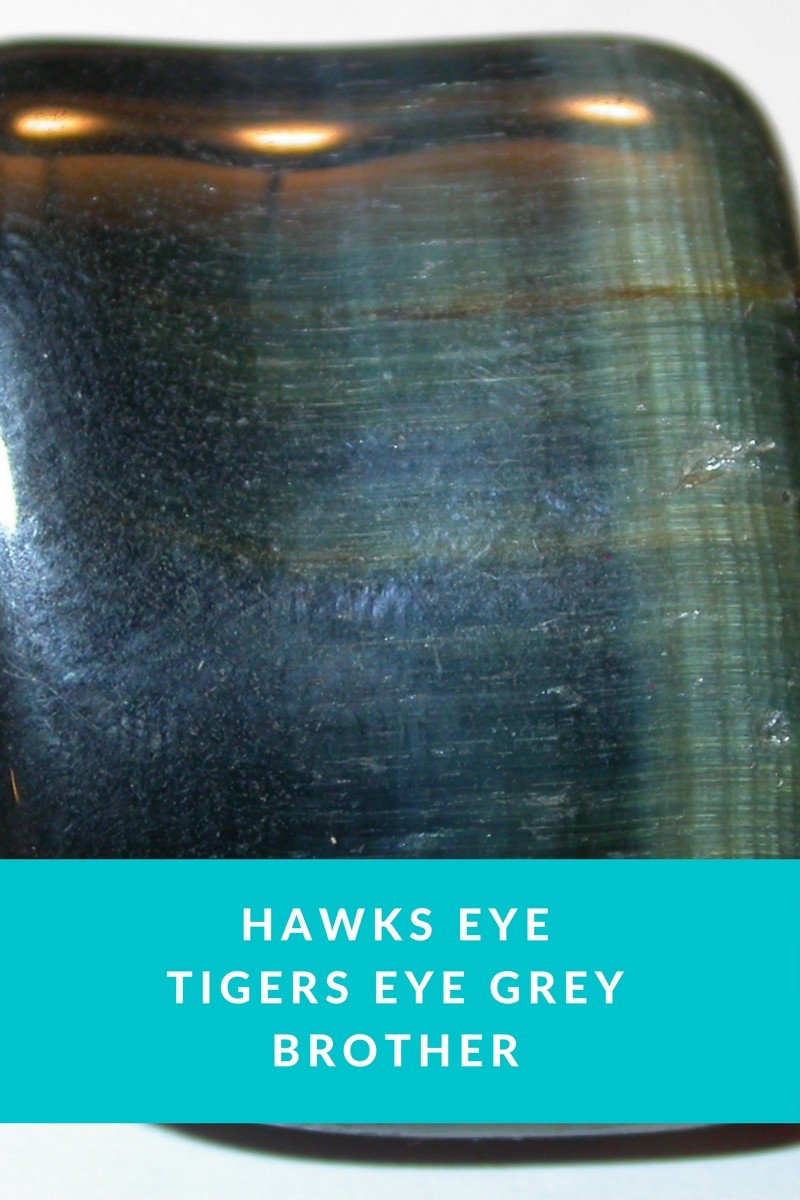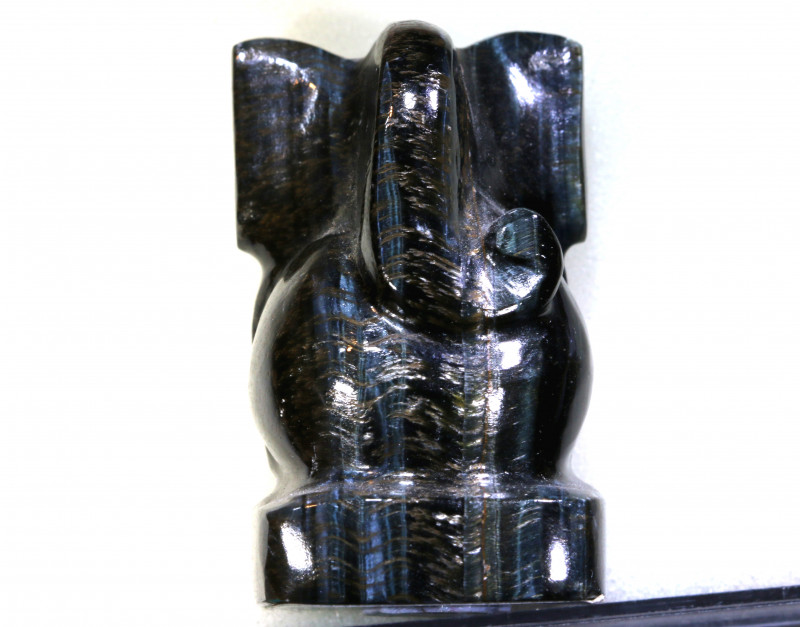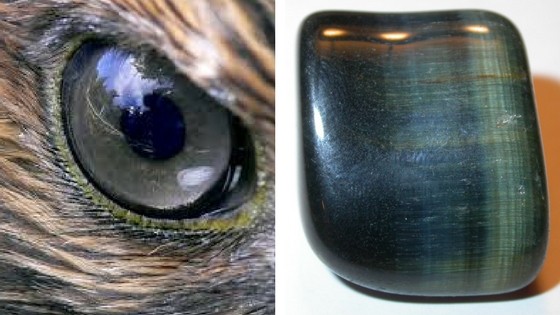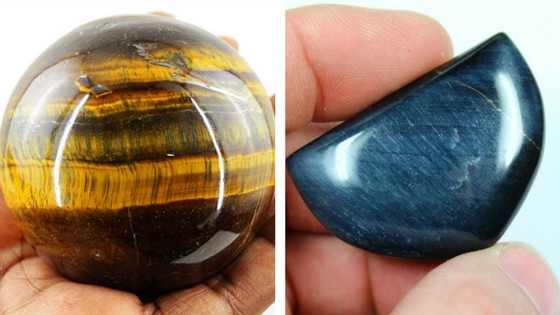
Hawk's Eye - Tiger Eye’s Grey Brother
 There are all sorts of gemstones out there. Not surprisingly, many of these gemstones are somewhat related to each other, because they are often simply varieties of the same mineral. One such gemstone is Hawk's Eye, which we affectionately recognize as Tiger Eye’s grey brother.
There are all sorts of gemstones out there. Not surprisingly, many of these gemstones are somewhat related to each other, because they are often simply varieties of the same mineral. One such gemstone is Hawk's Eye, which we affectionately recognize as Tiger Eye’s grey brother.
Hawk's Eye is a blue-grey to blue-green gemstone mostly composed of microcrystalline quartz, or chalcedony. Unlike most chalcedony varieties, hawk's eye is a rock, not a mineral.
This special variety is achieved through the pseudomorph nature of Hawk's Eye. "Pseudomorph" refers to a stone that has replaced part of another mineral over long periods of time. Hawk's Eye is a pseudomorph of macrocrystalline quartz. It began life as the mineral crocidolite and slowly transformed into Hawk's Eye over time.
Crocidolite is one of the many forms of asbestos, and it has a blue, fibrous composition. It gradually achieves the pseudomorph transformation when quartz begins to embed itself between those fibers, slowly replacing the entirety of the gemstone while still maintaining its shape and texture.

Hawk's Eye Sources
Hawk's Eye has many sources across the world, including Burma, Spain, South Africa, Australia, China, and many others. But the most significant deposits are located in Thailand and the Northern Cape province of South Africa, the two largest commercial suppliers of Hawk's Eye stones.

Hawk's Eye and Tiger's Eye
Ironically, rather than calling Tiger's Eye the brother of Hawk's Eye, it may be more accurate to say that Hawk's Eye is the parent of Tiger's Eye. After all, Tiger's Eye actually starts as Hawk's Eye.
The transformation of crocidolite to quartz leaves behind oxide; if there is minimal iron left over, you get the typical blue of the transformation, but more iron results in the golden brown color that defines Tiger's Eye. In the end, they are simply variants of the same thing.
That said, one of the biggest distinctive differences between Hawk's Eye and Tiger's Eye is their colors. While Tiger's Eye is a distinctive brownish gold, Hawk's Eye is more grayish blue. As explained earlier, Hawk's Eye also has less iron in it than Tiger's Eye, hence the color it has.
 Pictured above: Tiger's Eye on the left, Hawk's Eye on the right
Pictured above: Tiger's Eye on the left, Hawk's Eye on the right
Still, when considering Hawk's Eye, it’s important to keep in mind that they are often a variety of different colors, and even though they tend to be primarily bluish-gray or blue-green, they can still have notable streaks of golden brown in them. The stones themselves often bear multiple colors across their surface regardless. Whether or not this affects their worth is up to the individual’s personal preference, but the presence of gold or brown in Hawk's Eye does not indicate defectiveness in any way. Streaks of golden brown are usually the result of a slightly higher level of iron in that particular area.
For the record, the majority of Hawk's Eye gemstones are not treated in any way. However, some can be dyed for darker colors, or treated with nitric acid to lighten their colors. Gem dealers will almost always notify you if such enhancements have been used on a Hawk's Eye gemstone, but if you need extra peace of mind, you can always ask.
SHOP FOR TIGER'S EYE & HAWK'S EYE
Search the Gemstone Encyclopedia
Related Auctions
Related Articles
Everyone has a gemstone that corresponds with their star sign. These are also known as your Star Stone. Learn more about these stones and find out what your Star Stone is.
10th May 2018
Tahitian Pearls are the beautiful darker colored Pearls that come in so many different shapes, sizes and colors.. Learn more about this gemstone and browse the beautifully pearls we have for sale.
9th May 2018
How are Gold nuggets formed? Most nuggets are formed when molten Gold is fluid and seeps into cracks and fissures in host rocks similar to how many gemstones are formed.
15th Oct 2020
Latest Articles
Shortite is a rare mineral and rarer gemstone, usually found as colorless or yellow wedge-shaped crystals. Learn the value, history, and properties of shortite in this guide!
9th Dec 2024
Senarmontite is an uncommon antimony mineral mostly used industrially but occasionally collected as rare gems or pearly crystals. Find out all of the traits, uses, prices, and history of senarmontite.
27th Nov 2024
Tantalite is a group of red, brown, or black minerals containing the rare and valuable element tantalum. Discover the uses, history, prices, and properties of tantalite gemstones in this guide!
11th Nov 2024
Article Categories
How To's is where you will find helpful articles from gem Rock Auctions on how to cut gemstones, select gemstones and buy gemstones.
9 Articles





